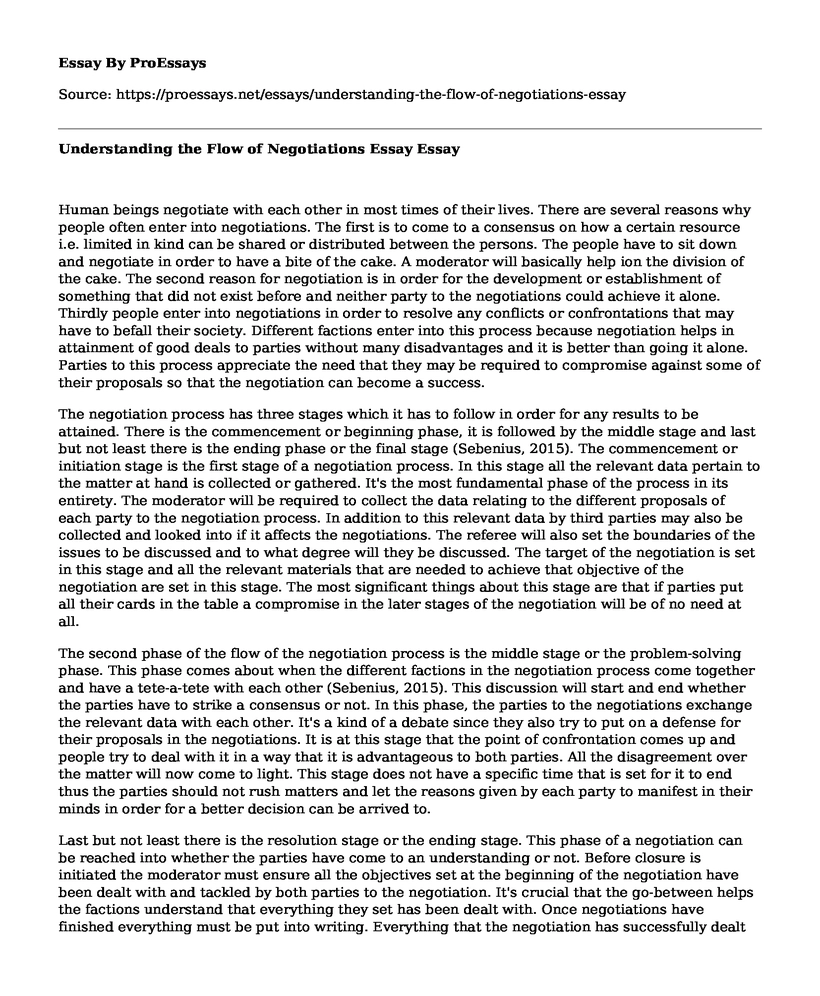Human beings negotiate with each other in most times of their lives. There are several reasons why people often enter into negotiations. The first is to come to a consensus on how a certain resource i.e. limited in kind can be shared or distributed between the persons. The people have to sit down and negotiate in order to have a bite of the cake. A moderator will basically help ion the division of the cake. The second reason for negotiation is in order for the development or establishment of something that did not exist before and neither party to the negotiations could achieve it alone. Thirdly people enter into negotiations in order to resolve any conflicts or confrontations that may have to befall their society. Different factions enter into this process because negotiation helps in attainment of good deals to parties without many disadvantages and it is better than going it alone. Parties to this process appreciate the need that they may be required to compromise against some of their proposals so that the negotiation can become a success.
The negotiation process has three stages which it has to follow in order for any results to be attained. There is the commencement or beginning phase, it is followed by the middle stage and last but not least there is the ending phase or the final stage (Sebenius, 2015). The commencement or initiation stage is the first stage of a negotiation process. In this stage all the relevant data pertain to the matter at hand is collected or gathered. It's the most fundamental phase of the process in its entirety. The moderator will be required to collect the data relating to the different proposals of each party to the negotiation process. In addition to this relevant data by third parties may also be collected and looked into if it affects the negotiations. The referee will also set the boundaries of the issues to be discussed and to what degree will they be discussed. The target of the negotiation is set in this stage and all the relevant materials that are needed to achieve that objective of the negotiation are set in this stage. The most significant things about this stage are that if parties put all their cards in the table a compromise in the later stages of the negotiation will be of no need at all.
The second phase of the flow of the negotiation process is the middle stage or the problem-solving phase. This phase comes about when the different factions in the negotiation process come together and have a tete-a-tete with each other (Sebenius, 2015). This discussion will start and end whether the parties have to strike a consensus or not. In this phase, the parties to the negotiations exchange the relevant data with each other. It's a kind of a debate since they also try to put on a defense for their proposals in the negotiations. It is at this stage that the point of confrontation comes up and people try to deal with it in a way that it is advantageous to both parties. All the disagreement over the matter will now come to light. This stage does not have a specific time that is set for it to end thus the parties should not rush matters and let the reasons given by each party to manifest in their minds in order for a better decision can be arrived to.
Last but not least there is the resolution stage or the ending stage. This phase of a negotiation can be reached into whether the parties have come to an understanding or not. Before closure is initiated the moderator must ensure all the objectives set at the beginning of the negotiation have been dealt with and tackled by both parties to the negotiation. It's crucial that the go-between helps the factions understand that everything they set has been dealt with. Once negotiations have finished everything must be put into writing. Everything that the negotiation has successfully dealt with should be written and also what happens in the case when a party goes back on its word. In other instances, a resolution stage may be achieved when the parties fail to reach an agreement that suits them (Crump, 2015).
Conclusion
The negotiation process has a certain flow it follows. It starts with the initiation phased to the problem-solving stage and lastly to the resolution phase. All these phases are crucial in whether the negotiation will become successful or not. This flow of negotiation does not depend on whether the parties reach an agreement or not but it's essential that it must be followed to completion. The moderator will later analyze the process and see its failures and achievements in order to improve on them in the next negotiation.
References
Sebenius, J. (2015). Introduction. Negotiation Journal, 31(4), 333-334. Doi: 10.1111/nejo.12102
Crump, L. (2015). Analyzing Complex Negotiations. Negotiation Journal, 31(2), 131-153. Doi: 10.1111/nejo.12086
Cite this page
Understanding the Flow of Negotiations Essay. (2022, Jul 19). Retrieved from https://proessays.net/essays/understanding-the-flow-of-negotiations-essay
If you are the original author of this essay and no longer wish to have it published on the ProEssays website, please click below to request its removal:
- Interactive Teaching Using the Technology-Oriented Framework
- Essay Incident That Changed My Life
- Essay on Management: Leadership and Management in Professional Contexts
- Thesis Example on Value Stream Management
- The Place of Leadership in Education in the UAE Research Paper
- Essay on IKEA's Sustainability Strategy: How Well Is It Doing?
- Paper Example on Annual Report: Financial Performance & Strategic Plans







